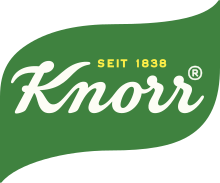Knorr (brand)
 Current logo used since 2019 | |
| Product type | Food, beverage |
|---|---|
| Owner | Unilever (Ajinomoto in Japan) |
| Country | Germany |
| Introduced | 1838 in Heilbronn, Germany |
| Related brands | Continental (Australia) Royco (Indonesia and Kenya) |
| Markets | Worldwide |
| Previous owners | Carl Heinrich Theodor Knorr Bestfoods Corporation |
| Ambassador(s) | Carl Heinrich Knorr |
| Website | www |



Knorr (/nɔːr/;[1] German: [knɔʁ]) is a food and beverage brand based in Heilbronn, Germany and founded in 1838. It has been owned by the British company Unilever since 2000, when Unilever acquired Best Foods, excluding Japan, where it is made under license by Ajinomoto. It produces dehydrated soup and meal mixes, bouillon cubes and condiments.
It was known as Royco in Indonesia and Kenya, and as Continental in Australia and New Zealand. Knorr is also produced in India[2][3] and Pakistan.[4]
History
[edit]
Knorr was founded in 1838 by Carl Heinrich Theodor Knorr (1800–1875). Knorr headquarters are in Heilbronn, Germany. Products previously sold under the Lipton brand (other than tea) are now being absorbed into the Knorr product line. With annual sales topping €3 billion, Knorr is Unilever's biggest selling brand.[5]
Bouillon cubes
[edit]In 1912, the first Knorr bouillon cube was introduced. Carl Heinrich Knorr began experimenting with drying vegetables and seasoning to preserve nutrition and flavour, which led to Knorr's first launch of dried soups across Continental Europe in 1873. The bouillon cube is typically made from vegetables and meat.
Worldwide
[edit]Knorr is available around the world. By 2000, the Knorr brand expanded to nearly ninety countries, from eight countries in 1957.[6][needs update] In Japan, Knorr is owned by Ajinomoto.
In the UK, the brand is known for its association with restaurateur Marco Pierre White.[7][8]
In Switzerland, the small red imp-like figure on packaging is known as "Knorrli" and was first used as a brand mascot in 1948.[9]
An Israeli company, based in Haifa, Israel Edible Products, produces kosher soups for Knorr that are sold in Israel and the United States.[10]
See also
[edit]References
[edit]- ^
- Wells, John C. (2007). "Knorr". Longman Pronunciation Dictionary (2nd ed.). Harlow: Longman. p. 422. ISBN 978-0-582-36467-7.
- Knorr United States (24 April 2023). Knorr Taste Combos | Chicken Bouillon :30 | It's not fast food, but it's so good!. Event occurs at 3s, 23s – via YouTube.
- ^ "Home". Knorr.in. Archived from the original on 28 November 2020. Retrieved 21 July 2018.
- ^ Marketing Strategies of Knorr Archived 25 September 2021 at the Wayback Machine brandyuva.in. Retrieved 25 September 2021
- ^ "Home Page". Knorr.pk. Archived from the original on 13 July 2020. Retrieved 21 July 2018.
- ^ "Knorr | Unilever Global". Archived from the original on 23 January 2011. Retrieved 21 January 2011. Unilever
- ^ "Knorr® Kitchen – Our History – Brand Story". 11 June 2015. Archived from the original on 11 June 2015. Retrieved 21 July 2018.
- ^ Cooke, Rachel (18 January 2015). "Marco Pierre White: My work was a painkiller – it was where I hid". The Observer. ISSN 0029-7712. Archived from the original on 16 February 2020. Retrieved 5 March 2020.
- ^ DeLorenzo, Ike (14 October 2010). "Unsavory Food Writing: The Case of Marco Pierre White". The Atlantic. Archived from the original on 3 July 2020. Retrieved 5 March 2020.
- ^ "10 Facts About Aromat: A Typically Swiss Condiment". 12 May 2017. Archived from the original on 16 October 2022. Retrieved 16 October 2022.
- ^ "IEP makes Knorr soups. (Israel Edible Products, kosher soups for Knorr Foods Co.)". 5 November 1993. Archived from the original on 22 February 2016. Retrieved 21 July 2018.
{{cite journal}}: Cite journal requires|journal=(help)
